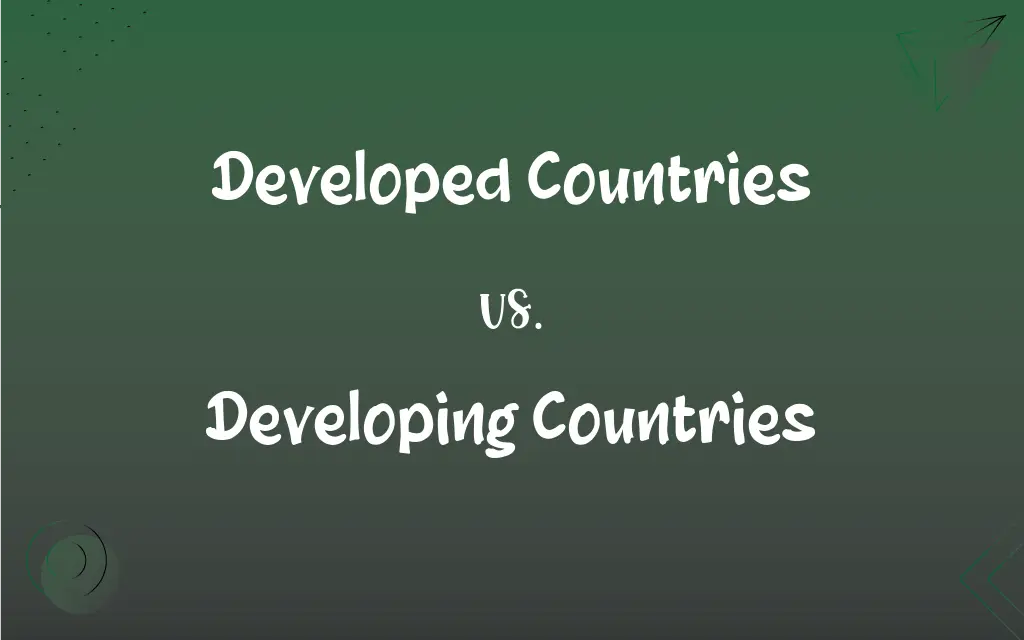Developed Countries vs. Developing Countries: What's the Difference?
Edited by Janet White || By Harlon Moss || Updated on October 4, 2023
Developed countries have advanced economies and high standards of living, while developing countries are in the process of industrialization with lower living standards.

Key Differences
The distinction between developed countries and developing countries lies fundamentally in their levels of economic development. Developed countries exhibit advanced economies, technological infrastructures, and a high Human Development Index (HDI). Conversely, developing countries are on the trajectory toward such advancements but haven't reached that stage yet.
In terms of infrastructure and services, developed countries have established systems like healthcare, education, and transportation. Their citizens often enjoy better access to basic necessities and public goods. On the other hand, developing countries face challenges in providing these services uniformly, with many of their regions still lacking.
Considering the economic aspects, developed countries have stable, prosperous economies, often characterized by high GDP per capita, low poverty rates, and diversified industrial sectors. In contrast, developing countries typically have economies dependent on a limited number of sectors, often agriculture, and face higher poverty rates.
From a social and health perspective, citizens in developed countries generally have a higher life expectancy, better health care services, and higher literacy rates. In developing countries, there might be higher infant mortality rates, lower literacy rates, and limited access to quality healthcare.
It's vital to note the dynamic nature of these classifications. Developing countries continually strive for progress and, over time, can achieve the socio-economic benchmarks of developed countries. Likewise, developed countries must maintain their progress lest they regress in their development status.
ADVERTISEMENT
Comparison Chart
Economic Status
Advanced economies
Economies in the process of industrialization
Infrastructure & Services
Established systems (healthcare, education)
Still developing systems with regional disparities
Economic Dependency
Diversified industrial sectors
Often reliant on a few sectors, like agriculture
Health & Literacy
Higher life expectancy, literacy rates
Lower life expectancy, literacy rates in many regions
Dynamic Nature
Must maintain their status
Striving for progress and can advance in status
ADVERTISEMENT
Developed Countries and Developing Countries Definitions
Developed Countries
Countries with a high standard of living and well-established public services.
Canada and Japan are examples of developed countries.
Developing Countries
Countries with lower living standards or underdeveloped industrial bases.
Several countries in sub-Saharan Africa are considered developing countries due to their economic profiles.
Developed Countries
Nations having a high GDP per capita and low poverty rates.
Australia's prosperous economy classifies it among developed countries.
Developing Countries
Nations striving to achieve better healthcare, education, and job opportunities for their citizens.
Many countries in Southeast Asia are developing countries focused on improving public services.
Developed Countries
Nations with high Human Development Index ratings.
Norway frequently ranks high as a developed country based on HDI.
Developing Countries
Countries where a significant percentage of the population lives below the poverty line.
Despite its vast resources, parts of Brazil still reflect traits of a developing country.
Developed Countries
Nations with high income and advanced technological infrastructure.
Most countries in Western Europe are considered developed countries.
Developing Countries
Nations in the process of rapid industrialization and experiencing higher than average growth rates.
India, with its rapidly growing economy, is a developing country.
Developed Countries
Countries with a mature and diversified economic base.
The U.S. is a developed country with a vast range of industries.
Developing Countries
Nations with economies often dependent on exporting natural resources or agricultural products.
Some Middle Eastern countries, despite their oil wealth, have attributes of developing countries in other sectors.
FAQs
Can a country transition from developing to developed?
Yes, many nations, like South Korea, have transitioned from developing to developed status over decades.
Are all African countries developing?
While many African countries are classified as developing, there are variations in development levels across the continent.
Are all developed countries rich in natural resources?
No, resource wealth doesn't solely define development. Japan, for example, is resource-scarce but is a developed country.
Do developed countries aid developing ones?
Often, developed countries provide financial aid, expertise, and trade opportunities to developing nations.
Is urbanization rapid in developing countries?
Yes, many developing countries experience rapid urbanization due to industrialization and job opportunities in cities.
Is healthcare access better in developed countries?
Generally, developed countries offer better and more widespread healthcare services to their citizens.
Do developed countries have higher life expectancies?
On average, developed countries tend to have higher life expectancies due to better healthcare and living conditions.
What are the primary indicators of developed countries?
High GDP per capita, advanced infrastructure, and high HDI are primary indicators of developed countries.
Is industrialization a trait of developing countries?
Yes, many developing countries are in the process of industrialization and rapid economic growth.
Can a developed country regress to a developing status?
It's rare, but severe economic, political, or societal challenges can lead to regression in development status.
Is access to education better in developed countries?
Typically, developed countries have more established educational systems with higher literacy rates.
What are emerging markets?
Emerging markets are economies in developing countries that are becoming more advanced, often rapidly.
Is tourism a major industry in developing countries?
For many developing countries, tourism can be a significant source of revenue and job opportunities.
Why are some countries still developing?
Historical factors, geopolitical issues, and economic challenges can slow a country's development process.
Are all European countries developed?
While many European countries are developed, some, especially in Eastern Europe, are still considered developing.
What role does technology play in classification?
Advanced technological infrastructure is often a hallmark of developed countries, while developing nations may still be working towards it.
Do developing countries have faster population growth?
Often, developing countries experience higher population growth rates than developed ones.
Do all citizens in developed countries have high living standards?
While the general living standard is high in developed countries, disparities can exist within any nation.
Are there global organizations focusing on development?
Yes, organizations like the World Bank and UNDP work towards global development goals.
Are developing countries poorer than developed countries?
Generally, developing countries have lower income levels and GDP per capita than developed countries.
About Author
Written by
Harlon MossHarlon is a seasoned quality moderator and accomplished content writer for Difference Wiki. An alumnus of the prestigious University of California, he earned his degree in Computer Science. Leveraging his academic background, Harlon brings a meticulous and informed perspective to his work, ensuring content accuracy and excellence.
Edited by
Janet WhiteJanet White has been an esteemed writer and blogger for Difference Wiki. Holding a Master's degree in Science and Medical Journalism from the prestigious Boston University, she has consistently demonstrated her expertise and passion for her field. When she's not immersed in her work, Janet relishes her time exercising, delving into a good book, and cherishing moments with friends and family.
































































